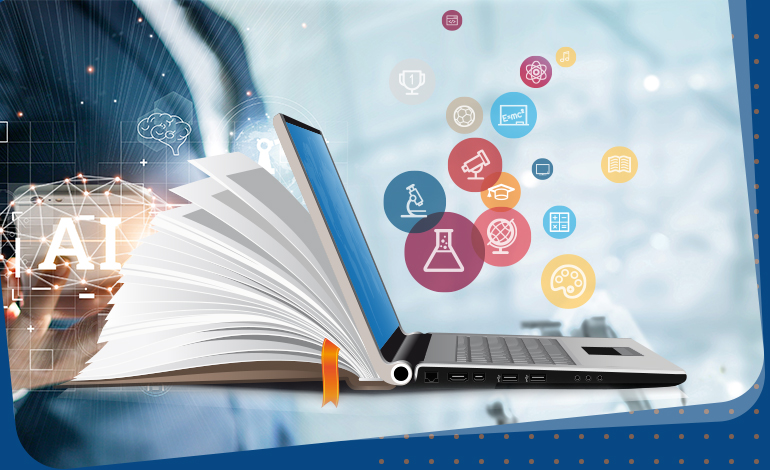Deliver Personalized Learning Experience with Artificial Intelligence
It’s a boom time for personalized learning, which is driven largely by on-job skill development programs featuring real-time competency analysis and online courses. From students to corporate professionals, most of them favor personalized learning. Per an Industry ARC report, the global personalized learning market is estimated to surpass $2 billion by 2024, growing at an estimated rate of around 29% from 2018 to 2024. And artificial intelligence (AI) is a great enabler to this.
What is personalized learning?
Personalized learning is a teaching approach in which the pace of learning and the learning instructions are optimized for each learner. It leverages AI and machine learning to offer interactive content to the learners with real-time performance analysis. This results in modifications to course content and timelines for efficient learning.
Personalized learning challenges traditional teaching practices by implementing a model where learning by doing takes place. The learning progresses at the rate of learners’ learning ability. As a result, it’s beneficial for corporate learning to upskill resources efficiently and for students to enhance their job readiness.
Why is personalized learning so critical today?
Think about how we now shop or watch TV online; it’s all personalized content. It’s only a matter of time before the same principles can be translated into the learning space. Today’s learning institutes face a wide range of challenges – disengaged students, high dropout rates, and the ineffectiveness of a traditional “one-size-fits-all” approach to education. This is a major topic of conversation with constantly evolving technologies and the need to upskill employees even in the enterprise learning space.
AI, when used right, can create effective personalized learning experiences which can help resolve most of these challenges. Let’s see how.
1. Boosts Engagement
AI can predict outcomes, allowing learning providers to offer content specific to a learner’s past performance and individual goals. For example, if there are skill gaps observed when a learner is taking a course, the algorithms can send targeted recommendations to help them build on their knowledge.
2. Real-time information and feedback
With AI, learners get all the information related to online resources needed to fill gaps and feedback in real-time, which equates to less seat time and training payroll hours. Learners get the information they need quickly. Even the L&D admins and support staff spend less time analyzing metrics and reports and can instead focus on producing effective learning content.
3. Automate content scheduling and delivery
AI is designed to handle routine tasks so humans can focus on other priority tasks and look at the big picture. With AI, the learning platform itself can schedule coursework for the learners or deliver resources based on individual learner assessment results or simulations. This can help the learning providers to automatically predict course maps for each of their learners and readjust as needed.
4. Boost ROI
It’s a given – AI helps the learning providers boost their ROI. And why not? After all, less time spent in training combined with personalization results in better learning outcomes. AI-equipped learning platforms can track and forecast every move of each of the learners, allowing learning providers to launch online learning resources wherever and whenever needed.
5. Innovative learning strategies
AI combines data collection and machine learning to bring automated and personalized learning strategies to life. Here’s how:
i) It identifies skills gaps and suggests the best ways to close them.
ii) It helps providers collect better and more accurate data on how learning materials are impacting individual and business performance.
iii) It proactively supports learners by deploying virtual coaches for a proactive response to personalized learning and development.
iv) It can collect and interpret a vast amount of data, enabling learning providers to easily gather key insights.
Is AI the future of personalized learning?
Research is still ongoing; however, most of the data points to AI being touted as the future of personalized learning. Personalized learning involves giving learners control to choose their learning styles and access learning resources at their pace and convenience. So, essentially, through AI, learners get to choose their preferred learning paths.
There are some challenges ahead, though. The most crucial is to help learners understand and prepare for the new technology-based world and the many disruptive technologies that will change the way work is done. Learners must understand that there always will be some tasks that must be automated, paving the way for roles requiring creative, cognitive, and emotional intelligence skills.
A reliable digital learning company can make the personalized learning experience effortless and help organizations and learners adapt to the most recent and relevant digital learning content delivery methodologies and mediums. We at Liqvid have specialized in AI for English language training (ELT). We analyzed the personalized learning paths of over 1 million learners on our platform for developing our AI tools. Our tools for vocabulary building, automated essay scoring, voice recognition for fluency development, and analytics can assign different learning paths based on learning styles. You can learn more about these AI tools by clicking HERE.

